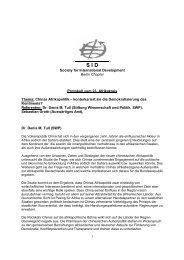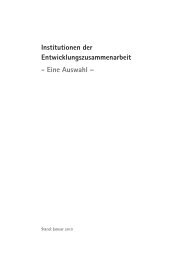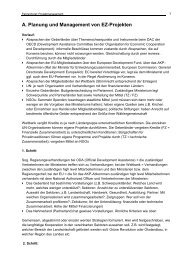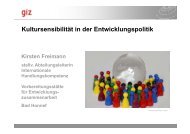Konferenzbericht (PDF-Dokument, 3 MB) - SID
Konferenzbericht (PDF-Dokument, 3 MB) - SID
Konferenzbericht (PDF-Dokument, 3 MB) - SID
Sie wollen auch ein ePaper? Erhöhen Sie die Reichweite Ihrer Titel.
YUMPU macht aus Druck-PDFs automatisch weboptimierte ePaper, die Google liebt.
Wissen wandert<br />
pora thus constitutes an invisible welfare system in<br />
many African countries, especially for rural areas. Unlike<br />
normal foreign direct investment, more money goes in<br />
from the Diaspora during periods of crisis to support<br />
relatives.<br />
The Diaspora has been very successful in leveraging<br />
our access in Africa productively, leading to the devel-<br />
opment of innovative policies and programmes such as<br />
AFFORD SEEDA programme (see below). Different<br />
organisations have emerged, with different focus areas<br />
(health, education, sup-porting entrepreneurship, etc)<br />
but all with the same agenda – how we can harness the<br />
skills of Africans in the Diaspora (remittances, „brain<br />
circulation‟, investment, etc) for African development.<br />
Oneykachi Wambu<br />
These organisations are able to be effective because of<br />
the direct communication and feedback loop that they<br />
have with the grassroots in Africa. Diaspora organisa-<br />
tions thus an immediate picture of what is happening on<br />
the ground in Africa and are able to respond to those<br />
needs.<br />
Diaspora input into Development Policy<br />
The direct communication and feedback loop from the<br />
grassroots in Africa that the Diaspora benefits from has<br />
led Diaspora organisations to challenge the current Post<br />
„Band-Aid‟ development paradigm. Their criticism of the<br />
Post „Band-Aid‟ development paradigm is that it:<br />
66<br />
knowledge migrates<br />
- Ignored important African stakeholders (both in and<br />
outside Africa)<br />
- Many of its initiatives bred dependency<br />
- Ignored problems caused by lack of joined-up-policy<br />
across government departments<br />
- Ignored Africans‟ views and perspectives. For exam-<br />
ple, „Make Poverty History‟ in 2005 demanded £50<br />
billion extra for debt relief, extra aid and trade reform<br />
but made no mention of jobs – the number one issue<br />
for Africans!<br />
Furthermore the UN Economic Commission for Africa<br />
has said that Sub-Saharan Africa needs to generate 8<br />
million jobs every year to achieve sustainable develop-<br />
ment. The Diaspora maintains that any strategy to re-<br />
lieve poverty in Africa should be-gin with these how we<br />
find productive jobs for these 8 million people. This<br />
means an agenda that increasingly supports entrepre-<br />
neurship, enterprise development and pro-jobs growth.<br />
AFFORD’s Challenge to Policymakers<br />
AFFORD has urged policy-makers to work with the<br />
Diaspora to increase effectiveness of policy implementa-<br />
tion on the ground. Working with the Diaspora will<br />
- Redress the marginalisation of Africans in their own<br />
development<br />
- Acknowledge Diaspora as an important stakeholder<br />
in Africa‟s development<br />
- Support African Diaspora organisations<br />
- Engage Diaspora as policymakers<br />
- Tap into Diaspora‟s innovative policies and pro-<br />
grammes<br />
AFFORD’s own work in Africa - SEEDA<br />
To meet the 8 million African jobs challenge AF-FORD<br />
supports Small Medium Enterprises (SMEs) in Sierra<br />
Leone and Ghana through the SEEDA - Supporting







